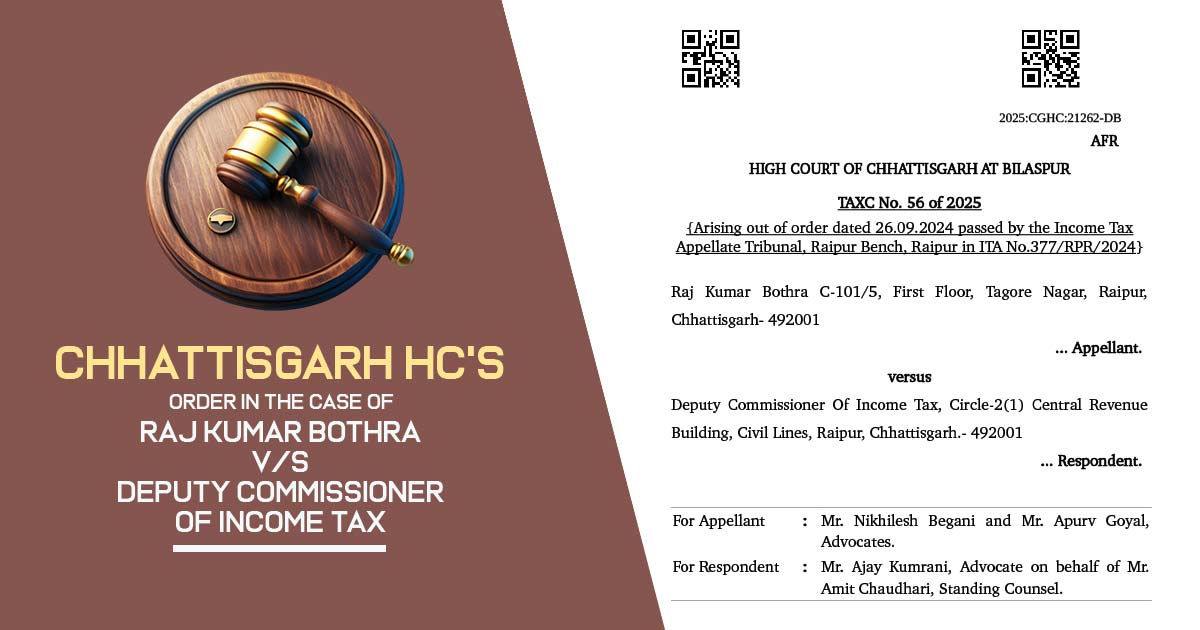
Section 143(1)(a) of the Income Tax Act, 1961 (the 1961 Act), cannot be invoked by the Assessing Officer (AO) to disallow a claim when the issue involved such as the deductibility of employees’ contributions to EPF/ESI under Section 36(1)(va) is pending consideration before the Supreme Court, as in Checkmate Services Pvt. Ltd. vs. CIT [(2023) 6 SCC 451].
A Division Bench of Justice Sanjay K. Agrawal and Justice Deepak Kumar Tiwari in the case held,
“…we are of the considered opinion that the Assessing Officer should not have resorted to the provisions contained under Section 143(1)(a) of the Act of 1961 and instead could have resorted to the provisions under Section 143(3) of the Act of 1961, as on the date of issuance of intimation order dated 16.12.2021 by the Assessing Officer, exercising power under Section 143(1)(a) of the Act of 1961, the subject issue was highly debatable and ultimately, that issue was resolved by their Lordships in the matter of Checkmate Services Pvt Ltd (supra) on a later date.”
Facts
For income for the Assessment Year 2020-21, a total income of Rs 3,76,34,910/- and paid tax amounting to Rs. 1,44,33,865/- has been declared by the taxpayers in the ITR.
When it was processed by Central Processing Centre (CPC), Bengaluru/Assessing Officer (AO), an intimation order was issued dated 16.12.2021, u/s 143(1)(a) of the Act, disallowing a claim for deduction of Rs. 28,21,065 as late deposit of employees’ contributions to Employees’ State Insurance (ESI) and Employees Provident Fund (EPF). The taxpayer, dissatisfied with it, contested the intimation order to the Commissioner of Income Tax (Appeals) u/s 246A of the Act.
In Checkmate Services, the Apex court has ruled and settled the problem of the claim of deduction u/s 36(1)(va) of the Act and ruled that for claiming the deduction under the mentioned provisions the employees contribution must get deposited on or before the last dates cited under the respective employees welfare acts.
CIT(Appeals) dismissed the appeal that was subsequently contested before the Income Tax Appellate Tribunal (ITAT), in which the appeal was again dismissed vide order on 26.09.2024 (impugned order). The taxpayer, on dissatisfaction, filed an appeal to the HC u/s 260A of the 1961 Act.
For the case, on the issuance date of the intimation order u/s 143(1)(a), i.e., on 16.12.2021, the issue of deduction u/s 36(1)(va) of the late deposit of employees EPF/ESI contributions was pending before the Supreme Court in Checkmate Services and it was solely on 12.10.2022 that the issue was settled.
Hence, the same was a debatable legal issue on the date of passing the intimation order, and it was overlooked by both the CIT(Appeals) and ITAT. It was claimed that the extent of section 143(1)(a) only extends to carrying out prima facie adjustments, and the disallowance of a claim as debatable as employees’ contribution u/s 36(1)(va), slips outside its extent.
Opposite to that, it was ruled by the respondent that the ruling in the checkmate services shall have the retrospective effect and that the adjustment incurred for the late deposit of the employee’s contribution was within the extent of authority of the AO to prima facie make an adjustment during the processing of the return.
The question of ITAT, which was then posed to the Division Bench of the High Court was whether the CIT (Appeals) and the ITAT were explained in keeping that the AO had correctly processed the return of the appellant u/s 143(1)(a) of the 1961 Act, overlooking the fact that under conflicting decisions on the issue of last date, the AO needed to apply the provisions included in Section 143(3)/Section 147.
Findings of the Court
The Division Bench admitted that on the issuance date of the intimation notice, the issue of deduction u/s 36(1)(va) was pending consideration before the Supreme Court in Checkmate Services, which was described eventually on 12.10.2022.
Before the Supreme Court‘s ruling in Checkmate Services, divergent views on the same issue were presented, with High Courts of Bombay, Himachal Pradesh, Calcutta, Guwahati and Delhi favouring the interpretation beneficial to the taxpayers, while High Courts of Kerala and Gujarat favoring the Revenue’s understanding that such contributions should be deposited within the stated due dates. The issue that arises is highly debatable from this divergence of views between different High Courts.
The section 143 grammar is been analyzed by court and shown that the authority under sub-section (1) of Section 143 of the 1961 Act is summary in nature made to cause the adjustment which is evident from the return in which the authority under sub-sections (2) and (3) extends to investigating the return and causing more in-depth investigation to reach at accurate resolution of the obligation.
Therefore, the court ruled that the AO must not have resorted to the provisions of section 143(1)(a) of the Income Tax Act, 1961.
It Was Said by the Court That,
“…the assessee in its audit report had only furnished the details of delayed deposit in Column 20(b) of the Form No.3CB and had not shown the same as disallowance. Therefore, the Assessing Officer has committed a grave legal error in processing the return of the assessee under Section 143(1)(a) of the Act of 1961…”
The court, for the question of Checkmate services having a retrospective effect, said that it was not posed as a problem in the present case.
The court, while authorizing the appeal, set aside the prima facie disallowance of impugned contribution for ESI and EPF u/s 36(1)(va) read with Section 2(24)(x) of the 1961 Act made by the AO u/s 143(1)(a) and therefore set aside the dismissal orders passed by the CIT (Appeals) and ITAT.
| Case Title | Raj Kumar Bothra C-101/5 vs. Deputy Commissioner Of Income Tax |
| Case No. | TAXC No. 56 of 2025 |
| For Appellant | Mr. Nikhilesh Begani and Mr. Apurv Goyal |
| Revenue by | Mr. Ajay Kumrani, Mr. Amit Chaudhari |
| Chhattisgarh High Court | Read Order |









